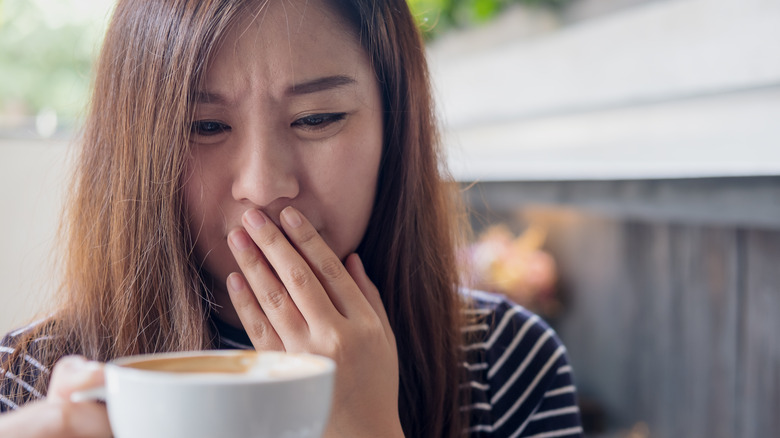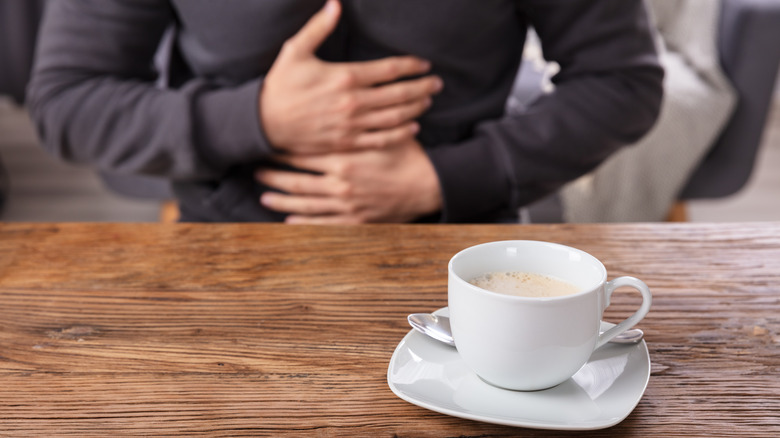The Real Reason Coffee Can Make You Feel Nauseous
Coffee has emerged as one of the most popular beverages worldwide — and for good reason. According to Healthline, it boosts your energy and mental focus, supports brain health, and wards off fatigue. If those weren't reasons enough for the 62% of Americans drinking coffee daily (via National Coffee Association), caffeine — the active compound in coffee — along with a number of antioxidants found in the brew help fight inflammation and protect against disease. Remarkably, coffee drinkers have a lower chance of dying from heart disease, stroke, or diabetes, and have less risk of colorectal cancer, Alzheimer's, and Parkinson's disease, according to experts from Johns Hopkins University School of Medicine.
Drinking moderate amounts of coffee can be a healthy habit. But like with most things, moderation is the key. Too many cups of brew can raise your heart rate and blood pressure, increase anxiety, and make it difficult to fall asleep, warns Johns Hopkins Medicine. To stay on the safe side, the Mayo Clinic advises not to exceed 400 milligrams of caffeine per day (about four cups of coffee).
Still, for some people, only a few sips of coffee may cause an adverse reaction. Jitters and queasiness are not uncommon side effects. Let's find out what it is about coffee that can make you feel nauseous.
Here's why you feel queasy after drinking coffee
When consumed in excess, coffee can affect your mood, sleep, and heart rate. One unwelcome side effect is nausea, according to research published in Psychopharmacology. Plus, some people are more sensitive to caffeine than others and may experience these problems even when drinking small amounts of coffee. Your age, genetics, and sleep habits all come into play. "For some people, one cup of coffee could feel like three or four," dietician Morgyn Clair told Insider.
Caffeine also increases stomach acid production, which can lead to heartburn or indigestion, notes the Cleveland Clinic. Nausea is a common symptom of indigestion, so you may feel sick after drinking coffee — especially if you go overboard. Your daily cup of java also contains chlorogenic acid and other compounds that can irritate the stomach lining, explains Columbia University. What's more, caffeine can affect your body's ability to absorb certain nutrients, such as iron and magnesium, which may result in nausea. This effect is more likely to occur in pregnant women, children, and seniors.
Last but not least, caffeine has diuretic and laxative properties, says nutritionist Lisa Richards (via Bustle). Therefore, it can wreak havoc on your digestive system, causing nausea, diarrhea, and dehydration. The addition of milk and artificial sweeteners only makes things worse. The Mayo Clinic warns that people with lactose intolerance may experience nausea, vomiting, and bloating within 30 minutes to two hours after consuming milk, heavy cream, or other lactose-containing products.
How to enjoy coffee without feeling sick
If you feel nauseous after drinking your cup of joe, it might be time to cut back on caffeine. Just make sure you do it gradually, recommends the Cleveland Clinic. For example, you could swap cold caffeinated beverages like energy drinks for water, or alternate between decaf and regular coffee. Extreme changes in consumption, such as going from six cups per day to three cups or less, can result in withdrawal symptoms, including nausea.
Another thing you can do is to drink more water entirely. Upping your consumption of H2O can mitigate the side effects of coffee on your stomach and prevent dehydration, according to clinician and gut health specialist Sunni Patel (via Bustle). He also recommends sticking to black coffee or using dairy-free vegan milk instead of cow's milk to help curb upset stomach. Almond milk, soy milk, coconut milk, oat milk, and rice milk all provide extra tasty flavor.
Ideally, before drinking coffee, have something to eat. Food slows down caffeine absorption into the bloodstream and may help prevent digestive discomfort (per Caffeine Informer). Whole-grain toast, oatmeal, porridge, and other high-fiber foods might do the trick. Alternatively, try switching to dark roast coffee, which has lower levels of chlorogenic acid and other substances that may cause nausea, suggests Columbia University.



